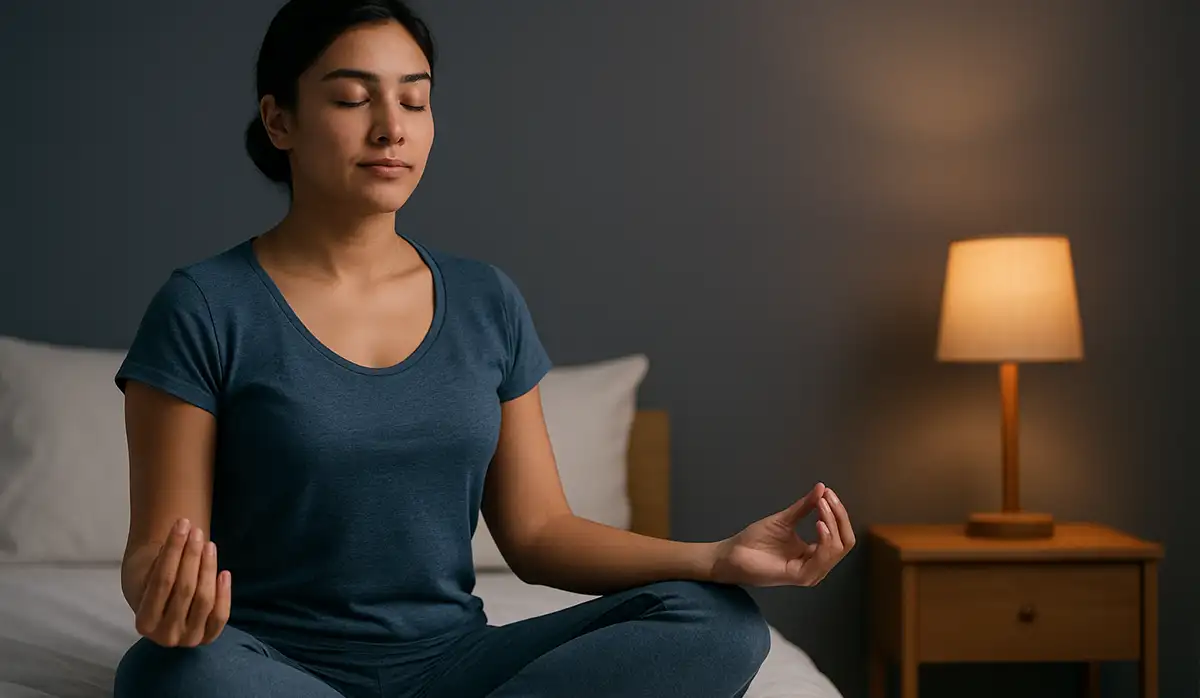Benefits of Meditation for Sleep – Sleep Better Naturally

Can’t sleep? You’re not alone. Millions of people toss and turn every night, staring at the ceiling and willing themselves to drift off. While some reach for sleeping pills, others are turning to something far more natural and accessible: meditation.
Meditation for sleep isn’t just trendy—it’s backed by science, loved by insomniacs, and super simple to try. Let’s dive into how this ancient practice can help you catch more ZZZs and wake up feeling genuinely refreshed.
Read also: Sabja Seeds: The Superfood You Didn’t Know You Needed
Table of Contents
What is Meditation?
Definition and Origins
Originating thousands of years ago in spiritual “meditation for sleep” traditions like Buddhism and Hinduism, meditation has since evolved into a mainstream wellness technique embraced around the world.
Different Types of Meditation
There are many styles to explore:
- Transcendental Meditation: Involves repeating a mantra.
- Guided Meditation: A narrator walks you through a calming mental journey.
- Body Scan: You progressively relax different parts of the body.
Each can play a role in improving sleep, depending on your needs and preferences.
Why Sleep Matters
Sleep is when your body repairs, your brain processes memories, and your immune system recharges. Without enough quality rest, you risk more than just “meditation for sleep” feeling groggy—you compromise your mental clarity, physical health, and even emotional stability.
Consequences of Poor Sleep
Chronic sleep deprivation can lead to:
- Anxiety and depression
- Weight gain
- Weakened immunity
- Poor decision-making
- Increased risk of heart disease and diabetes
How Meditation Helps with Sleep
Stress Reduction and Cortisol Management
One of the biggest sleep killers? Stress. Meditation helps “meditation for sleep” by calming the nervous system and reducing levels of cortisol, the stress hormone that keeps you wired at night.
Activating the Parasympathetic Nervous System
Meditation shifts the body from the “fight-or-flight” response into “rest-and-digest” mode, which is crucial for preparing your body for sleep.
Mindfulness and Mental Clarity at Bedtime
Instead of worrying about tomorrow’s to-do list, meditation, “meditation for sleep,” helps you stay present, encouraging relaxation and emotional detachment from daily stressors.
Best Meditation Techniques for Sleep
Guided Meditation
Perfect for beginners, guided sessions are like bedtime stories for adults—soothing, comforting, and designed to lull you to sleep.
Body Scan Meditation
It’s deeply calming and promotes physical relaxation.
Breathing Exercises
Simple breathing patterns like the 4-7-8 method can slow your heart rate and ease anxiety, making it easier to drift off.
Loving-Kindness Meditation (Metta)
By fostering compassion for yourself and others, this form of meditation, “meditation for sleep,” helps dissolve anger or stress that might keep you up at night.
Scientific Evidence Supporting Meditation for Sleep
Clinical Studies on Insomnia and Meditation
Multiple studies have shown that meditation, “meditation for sleep,” can reduce insomnia symptoms, increase sleep duration, and improve overall sleep quality. One 2015 study published in JAMA Internal Medicine found that mindfulness meditation significantly improved sleep quality in older adults.
Meditation vs. Sleeping Pills: A Safer Alternative
While sleeping pills may work short-term, they often come with side effects and dependency risks. Meditation “meditation for sleep” offers a natural, side-effect-free approach that becomes more effective the more you practice.
Meditation and the Sleep Cycle
Deep Sleep and REM: Where Meditation Fits In
Meditation has been linked to increased levels of melatonin, the hormone responsible for regulating sleep. It also promotes longer periods of deep sleep and a more balanced REM cycle.
Improved Sleep Onset and Sleep Efficiency
You fall asleep faster and stay asleep longer. Many meditators report waking up fewer times during the night and feeling more rested in the morning.
Real-Life Success Stories
Testimonials from Everyday People
“I used to lie awake for hours. Now, just 10 minutes of meditation “meditation for sleep” before bed knocks me out.”
“Guided meditations changed my life—no more 3 AM panic attacks.”
How Meditation Changed Their Sleep Patterns
From overworked parents to college students, people across all walks of life are discovering that meditation is a game-changer for sleep without the side effects.
When and How to Meditate for Better Sleep
Ideal Time for Evening Meditation
30–60 minutes before bed is a sweet spot. This gives your mind time to slow down without rushing the experience.
Creating a Bedtime Meditation Routine
- Dim the lights
- Turn off screens
- Find a quiet space
- Play calming audio
- Breathe deeply and let go
Tools and Apps to Help You Meditate
Top Apps for Sleep Meditation
- Calm
- Headspace
- Insight Timer
- Balance
YouTube Channels and Podcasts to Try
- Jason Stephenson Sleep Meditations
- Sleepy Time Mumbles Podcast
- The Honest Guys (YouTube)
Common Challenges Beginners Face
Racing Thoughts While Meditating
It’s normal! Don’t fight it—just gently guide your focus back to your breath or voice guiding you.
Falling Asleep Too Soon
That’s okay, especially for sleep, “meditation for sleep” meditations. You’re doing it right if you nod off peacefully.
Staying Consistent
Set reminders, keep a journal, or meditate with a buddy to build consistency.
Meditation vs. Other Natural Sleep Remedies
Herbal Teas, Essential Oils, and Lifestyle Changes
While chamomile tea and lavender oil are great, meditation goes deeper, addressing the root causes of sleep disruption—stress and mental chatter.
Why Meditation Stands Out
It’s free, always available, and grows stronger with time. Unlike other remedies, its benefits extend beyond sleep, helping with focus, mood, and even relationships.
Tips for Making Meditation a Habit
- Start with just 5 minutes
- Use the same spot every night
- Be patient and forgiving with yourself
Who Should Try Meditation for Sleep?
Adults, Teens, and Seniors
Meditation is safe and effective for all ages.
People with Anxiety, Depression, or Sleep Disorders
Especially helpful for those who struggle with mental health-related sleep issues, meditation promotes calm and emotional regulation.
Conclusion
Sleep doesn’t have to be a nightly battle. Meditation offers a powerful, natural way to ease your mind, relax your body, and prepare for deep, restorative rest.
So, roll out your mat (or just lie on your bed), hit play on a guided session, and let your breath lead the way to dreamland.
FAQs
1. How long does it take to see results from meditation?
Many people notice improvements in sleep within just a few days, but consistency is key. You’ll likely see deeper results in 2–4 weeks.
2. Can meditation replace sleep medication?
It can be for many people. Always consult your doctor, but many have successfully reduced or eliminated sleeping pills after establishing a meditation routine.
3. Is it okay to fall asleep while meditating?
Absolutely. Especially with sleep-focused meditations, drifting off is the goal.
4. Do I need a teacher, or can I learn meditation on my own?
You can start on your own using apps, YouTube, or simple breathing techniques.
5. What’s the best type of meditation for beginners?
Guided meditations and body scans are great for beginners because they offer structure and help you stay focused.












